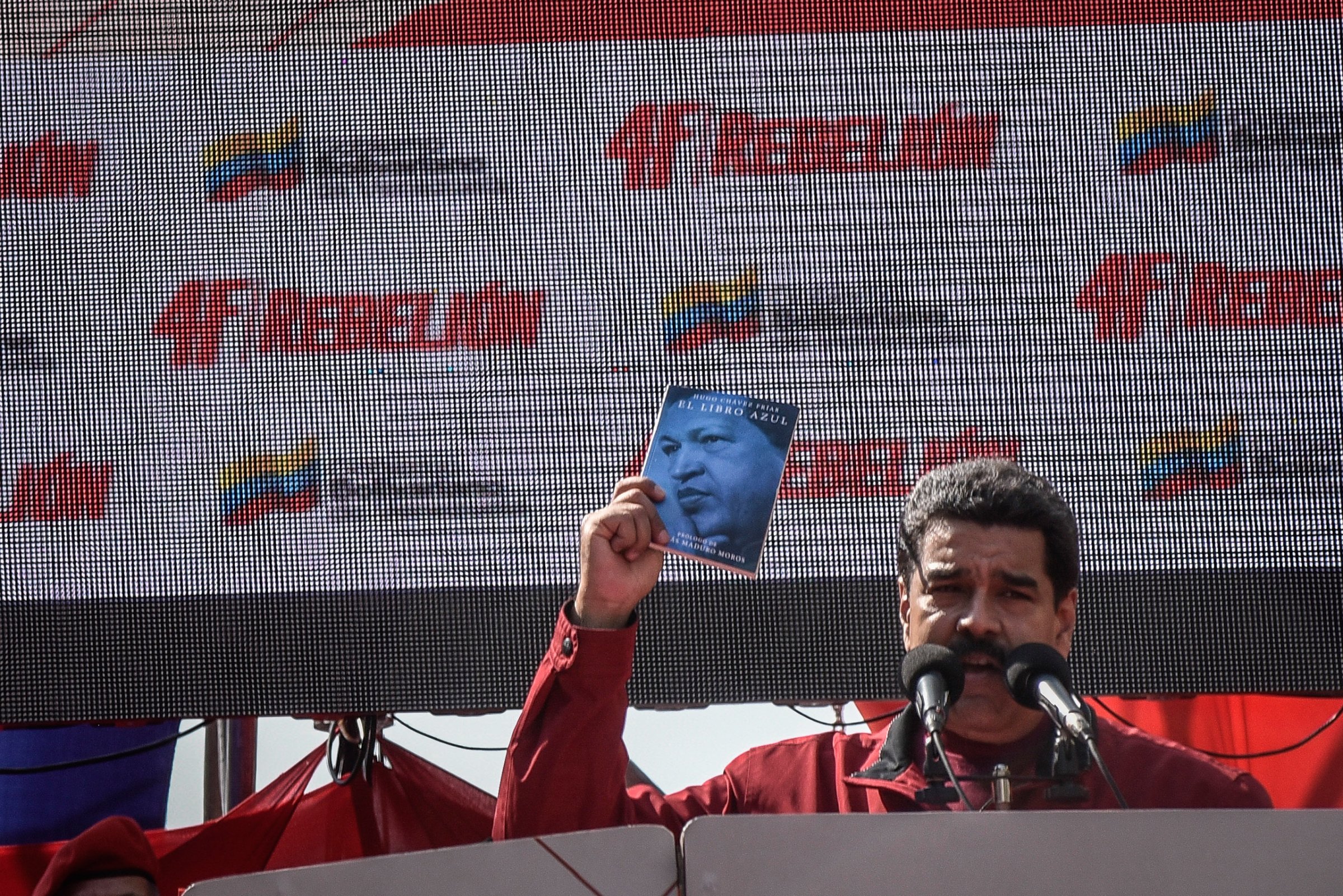
The last time Venezuelan politicians tried to topple a president, the blowback buried them. In 2002, they promoted a military putsch against socialist leader Hugo Chávez. But amid massive street protests, the coup collapsed and many of the conspirators fled the country or landed in prison.
That’s why on Tuesday, when a new generation of opposition leaders announced a campaign to dislodge Chavez’s successor, President Nicolás Maduro, they framed their plans as an exercise in people power.
Amid widespread shortages of food and medicine in Venezuela, a collapsing currency, a possible debt default, and the world’s highest inflation rate, opposition spokesman Jesús Torrealba announced a three-pronged strategy for regime change that he described as “constitutional and democratic.”
Plan A is to gather enough signatures to trigger a recall vote that would remove Maduro and open the door for new elections later this year. As a backup, opposition lawmakers will simultaneously attempt to pass a constitutional amendment to shorten Maduro’s six-year term which expires in 2019. Finally, Torrealba called on Venezuelans to take to the streets starting this weekend.
“We are calling for a nationwide mobilization to demand the resignation of Nicolás Maduro,” Torrealba told a Caracas news conference. “Change is coming and no one can stop it.”
Maduro says he isn’t budging. “No one is going to kick me out,” he declared last week.
But unlike 2002 when the socialist revolution was still young and Chávez, its founder, enjoyed widespread support, polls show that a majority of Venezuelans now want change. This time around, it’s Maduro and his cohorts who are widely viewed as the conspiring authoritarians.
Maduro, who replaced Chávez after he died of cancer in 2013, lacks his predecessor’s charisma and political skills. And in the face of the country’s worst economic crisis in modern history the president has, oddly, done almost nothing.
He has refused to scrap price and currency controls, roll back business expropriations or jettison other failed socialist policies. Instead, Maduro claims Venezuela’s problems are the result of an “economic war” being carried out against his government by a traitorous oligarchy. But analysts say there are other reasons for staying the course.
For one thing, hard-liners within the ruling Socialist Party see market-oriented reforms as a betrayal of the revolution, ushered in by Chavez in 1999. Other sectors benefit from the current economic distortions. For example, pro-government businesses with access to cheap U.S. dollars from the state can resell them on the black market at a huge mark up. Some garner big profits by selling price-controlled contraband food in neighboring Colombia.
Carlos Miguel Álvarez, a senior economist at the Caracas-based consulting firm Ecoanalitica, says that even if Maduro wanted to change course it’s unclear whether his cabinet ministers have the technical knowhow to put the reforms in place. For all of these reasons, opposition congressman José Manuel Olivares describes Maduro as “a hostage of his own government.”
But he is also a wily survivor. Maduro has weathered three years of deep turmoil, including a collapse in prices for oil, Venezuela’s main export. And the path to remove him is all uphill.
The recall effort would require the opposition to gather nearly 4 million signatures for a petition in just three days while nearly twice that number of voters would have to cast ballots to revoke Maduro’s presidency. An amendment to shorten his term could be struck down by the courts which — like all other government bodies except for congress — is controlled by the ruling socialists.
The Maduro administration has already shown itself highly skilled at political sabotage. Since the opposition-controlled legislature was sworn-in two months ago, cabinet ministers have refused to testify before congress. Judges temporarily stripped three lawmakers of their seats which has denied the opposition a two-thirds supermajority that would give it far more leverage. In addition, pro-government mobs often surround the parliament building and pelt opposition legislators with eggs and tomatoes.
True, throngs of people marching through Caracas and other cities to demand his ouster would ratchet up the pressure on Maduro. But in 2014, security forces violently repressed anti-government demonstrations. More than 40 people were killed while hundreds more face legal charges and long prison sentences. The fierce response has, up to now, knocked the wind out of the protest movement.
Yet what could tip the balance is turmoil within the revolution. Factions inside the Socialist Party and the armed forces now see Maduro as dead weight, says Vladimir Villegas, a former ambassador who worked for Maduro during his earlier stint as foreign minister.
One concern is that Maduro’s downward spiral could weaken the Socialist Party to the point where it would not even stand as a viable opposition force should it lose the presidency. Military officers, in turn, feel the pinch of inflation and food shortages and worry that they will once again be called upon for the unpopular task of crushing protests. One scenario has Maduro bowing out in favor of Vice President Aristóbulo Istúriz, a pragmatist who has shown an ability to negotiate with the opposition.
Referring to party loyalists, Villegas says: “Chavismo will not allow itself to be destroyed due to the failures of one man.”
More Must-Reads from TIME
- How Donald Trump Won
- The Best Inventions of 2024
- Why Sleep Is the Key to Living Longer
- Robert Zemeckis Just Wants to Move You
- How to Break 8 Toxic Communication Habits
- Nicola Coughlan Bet on Herself—And Won
- Why Vinegar Is So Good for You
- Meet TIME's Newest Class of Next Generation Leaders
Contact us at letters@time.com